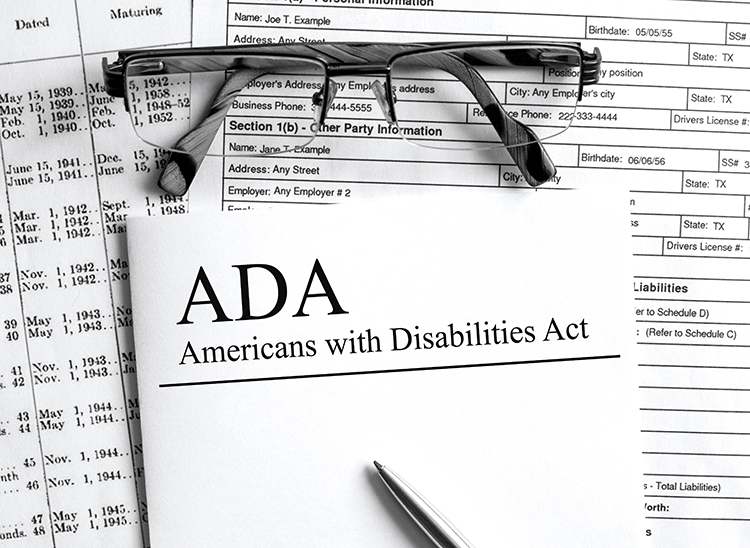Law grads with past substance-use disorders suffered disability bias in quest for license, DOJ says

According to the U.S. Department of Justice, would-be Tennessee lawyers encountered unlawful disability discrimination when they were required to submit to “burdensome examinations.” (Image from Shutterstock)
Would-be Tennessee lawyers encountered unlawful disability discrimination when they were required to submit to “burdensome examinations” and conditions triggered by their past diagnosis or treatment for a substance-use disorder or a mental health disorder, the U.S. Department of Justice has concluded.
The Tennessee Board of Law Examiners and the Tennessee Lawyers Assistance Program violated Title II of the Americans With Disabilities Act, which protects people with from being excluded from programs of state and local governments, according to a letter of findings released Dec. 17.
The DOJ investigated after receiving complaints from two bar applicants, “D.S.” and “C.B.,” who were previously treated for substance-use disorders related to prescription drugs. Both suffered “significant economic harm,” including loss of jobs because of delays in obtaining a law license and costs incurred in complying with required evaluations by treatment facilities.
The conditions for obtaining a law license were “burdensome, intrusive and unnecessary,” the letter said.
NBC News has identified D.S. as Derek Scott, who was taking buprenorphine, a Food and Drug Administration-approved medication that his doctor prescribed, to treat the opioid-use disorder that he developed after becoming addicted to painkillers. The network chronicled Scott’s battle for a law license.
Scott, now an attorney in Clarksville, Tennessee, has been treated continuously for opioid-use disorder since 2012. He graduated from the University of Tennessee College of Law in 2019. On his bar application, Scott disclosed charges that were later dismissed, most of which happened when his addiction to painkillers was untreated.
Because Scott was taking buprenorphine, he was required to undergo a multiday assessment at an addiction-recovery facility that cost him $2,000. No drugs were found in his system other than buprenorphine. No cognitive impairment was found. The facility nonetheless recommended a six-month inpatient treatment program that would cost Scott $30,000, an amount lowered to $15,000 with credit for the $2,000 already spent because of scholarship money from the Tennessee Lawyers Assistance Program.
Scott’s treating physician “emphatically” disagreed with the need for inpatient treatment to stop a medication that was effectively treating his disability, the DOJ letter said. If he didn’t comply, Scott was told, he wouldn’t get a law license.
“Thus, D.S. was left with the choice of continuing the treatment that is successful for him in treating his [opioid-use disorder] or obtaining his license to practice law,” according to the letter of findings.
The law firm that had employed Scott as a law clerk fired him in November 2021 because of his inability to get a law license.
Scott sought a second evaluation by another facility and was granted permission. A psychiatrist there found that the drug therapy had been successful, and there were no legal, educational or occupational deficiencies. The medical report nonetheless concluded that Scott was not fit to practice law, and that abstinence treatment at a facility should be considered.
After the DOJ notified the Tennessee agencies in September 2023 that it was investigating, Scott received his law license.
The other lawyer, C.B., had completed an inpatient rehabilitation program in 2010 and graduated from law school in 2020. C.B. informed the Tennessee Board of Law Examiners that several misdemeanor arrests happened while he was abusing alcohol and Xanax, which is often used to treat anxiety disorders and anxiety caused by depression. A board interviewer concluded that C.B. had no mental or psychological disorder that would affect his ability to practice law.
C.B. was nonetheless referred to the Tennessee Lawyers Assistance Program for evaluation and was required to pay $6,000 for a psychological and drug assessment. The medical report found that C.B. was fit to practice law but recommended abstinence-based outpatient therapy for substance-use management and physical therapy for pain. He should also quit smoking and get his cholesterol checked, the report said.
The Tennessee Lawyers Assistance Program said C.B. should get outpatient treatment in a drug program four days per week. C.B. lost his job and moved from Ohio to Tennessee to attend a seven-week program. He was then allowed to obtain a law license as long as he entered a five-year monitoring contract and submitted to random drug tests.
The restrictions and conditions imposed on Scott and C.B. “were based on speculation about their disabilities that were contrary to demonstrated conduct, and as to D.S. in particular, they were based on stigma and stereotypes about his prescribed treatment,” the letter said.
Scott told NBC News that he felt validated by the findings.
“I felt like they had put up an obstacle that they knew I couldn’t overcome,” he said.
Scott works as a lawyer primarily handling criminal defense cases, according to NBC News. He continues to take his medication.
NBC News spoke with civil rights attorney David Sinkman, who handles substance-use bias cases, about the DOJ letter. He was not involved in the case.
“This is a powerful finding by the Department of Justice that applies beyond admission to practice law in Tennessee, since there are similar licensing restrictions in other states and for other professions,” Sinkman said.



